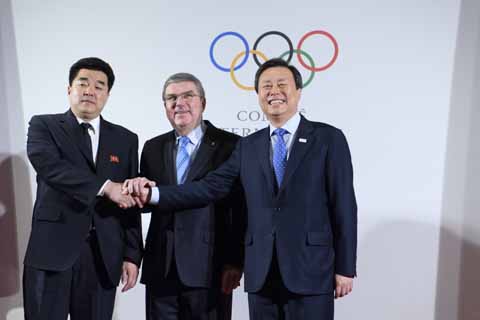
AFP, Lausanne :
After the two Koreas struck a deal for the North to attend the Winter Games in the South, Olympic bosses will try Saturday to resolve the devils in the details of the landmark pact.
With less than three weeks to go before the Games in Pyeongchang begin, the most momentous decisions have already been made.
North and South Korea will march together at the opening ceremony under a unification flag and field a united women’s hockey team, while the North has said it will send a 550-member delegation to the Games. North Korea has taken part in seven of the last 12 Winter Olympics, most recently in Vancouver 2010.
But its presence in Pyeongchang-just 80 kilometres (50 miles) south of the demilitarised zone that divides the Koreas-is a significant diplomatic coup, especially after months that saw nuclear and missile tensions surge to new heights.
Now the International Olympic Committee has to sign off on the terms agreed by Seoul and Pyongyang-and try to implement them without tarnishing Olympic rules.
IOC president Thomas Bach is hosting a mini-summit at the organisation’s headquarters in Lausanne, Switzerland, with the leaders of the Olympic committees from both Koreas as well Pyeongchang 2018 organisers.
Senior government officials from both countries will also be on hand.
The meeting-where the Olympic movement could be cast as a key player in easing tensions between two nations still technically at war-will be a welcome reprieve for the IOC.
Recent high-profile meetings in Lausanne have not been about peacemaking. Instead, they have been consumed by discussions on how heavily Russian athletes should be punished for egregious doping.
The IOC has conceded that the intra-Korean deal has made its job more complicated. “There are many considerations with regard to the impact of these proposals on the other participating (nations) and athletes”, an IOC spokesman said this week.

